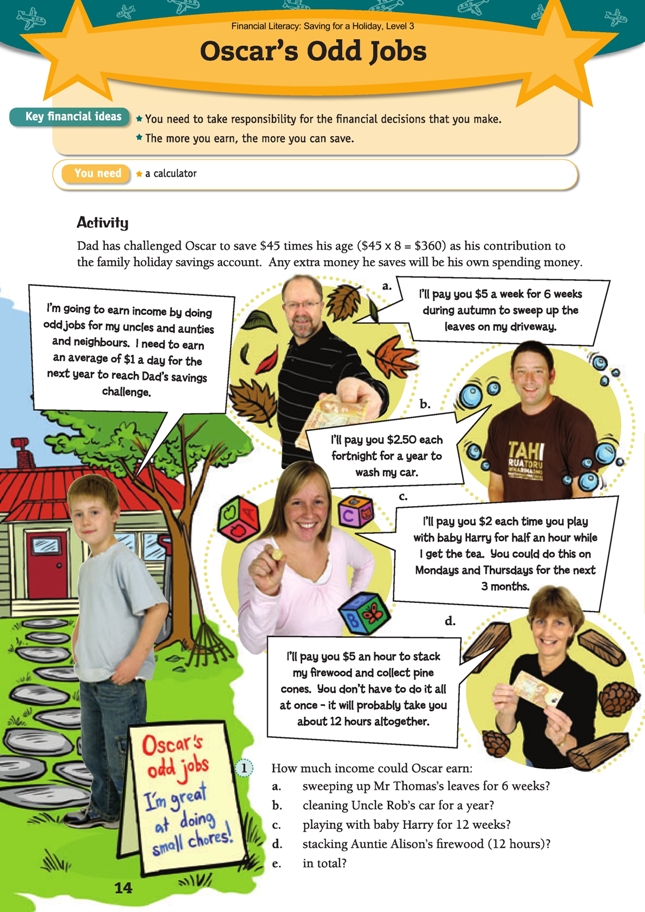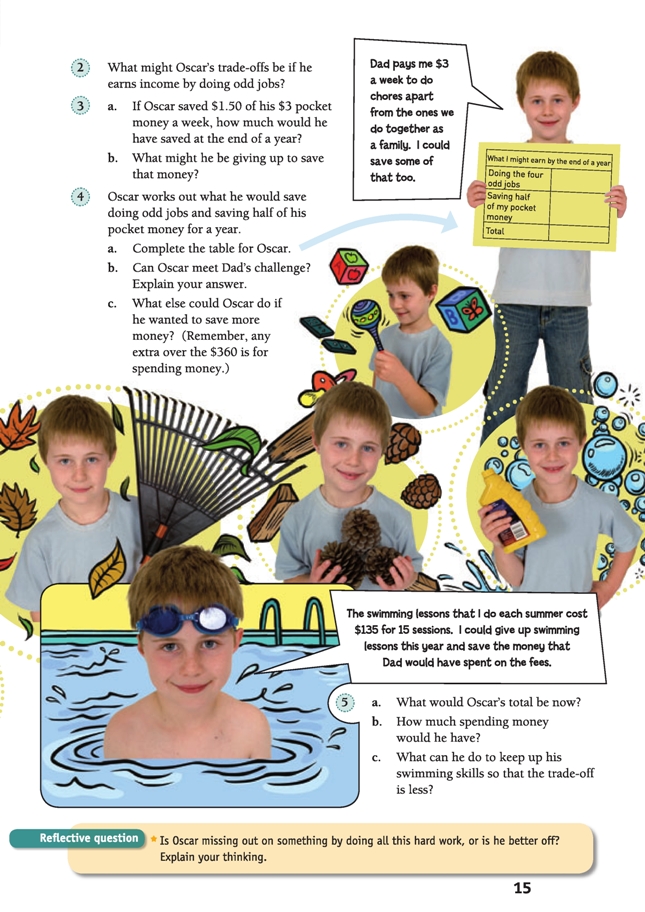This is a level 3 number activity from the Figure It Out series. It relates to Stage 6 of the Number Framework.
A PDF of the student activity is included.
Click on the image to enlarge it. Click again to close. Download PDF (3669 KB)
use multiplication to solve money problems
use addition to solve money problems
Number Framework Links
This activity involves addition, subtraction, and multiplication of 1- to 3-digit numbers. Students working at stage 6 should be able to solve all the problems in this activity mentally or in paper form. Those who are at stage 5 may need materials such as tens money or a calculator to enable them to complete the activity.
A calculator
Mathematics and statistics
For this activity, the students will need to know that there are about 52 weeks in a year and about 26 fortnights.
Encourage your students to think of the problems in question 1 multiplicatively by asking them for a number sentence that describes each one, for example, earning $5 a week sweeping leaves for 6 weeks can be written as 6 lots of $5 is or symbolically as 6 x $5 = .
Students could design a record-keeping notebook or spreadsheet or graph that Oscar (or they) could use to keep track of their income and progress towards their savings goal.
Financial understanding
In this activity, Oscar realises that he has to put in a great deal of effort if he is going to meet his financial goal (Dad’s challenge). This hard work will have many benefits and also some opportunity costs (trade-offs).
Students will realise that personal goals influence financial success or otherwise.
Oscar matches his personal goals and capabilities to his small “odd-jobs” business in order to raise money for the family holiday. This enterprising attribute is very important if people are to manage themselves and reach their potential.
In this activity, students calculate what Oscar could earn if he does odd jobs and they compare what he earns with his savings goal. They also gain an understanding of the importance of planning for personal and financial success.
Question 2 involves trade-offs (also called opportunity costs), that is, what we give up in order to get something else. This concept was developed in The Great Trade-off Game on pages 12–13 of the students’ book.
For question 3, talk about why Oscar has to do some unpaid chores because he’s a part of the family and what those chores might be. Ask: Do you have jobs that you’re expected to do, that you don’t get paid for, but which you do to help make your household function because you’re a member of the family? What are they? Why are those jobs sometimes described as “chores”?
Students may be interested in creating their own odd-jobs business. They could design a flier for their extended family and friends advertising their services. As a class, have them brainstorm a list of the sorts of things students at their age level could do to earn money.
Social Sciences Links
Achievement objective:
• Understanding how people make decisions about access to and use of resources (Social Studies, level 3)
The students could discuss:
– how Oscar will decide if the jobs are worth the effort
– what he will have to know or organise before he makes a decision to take on a particular job (for example, will Uncle Rob provide the car wash equipment?)
– what the different costs and trade-offs are that Oscar must think about (for example, work versus play, work versus homework).
Other Cross-curricular Links
Technology achievement objective:
• Outcome development and evaluation: Investigate a context to develop ideas for potential outcomes. Trial and evaluate these against key attributes to select and develop an outcome to address the need or opportunity. Evaluate this outcome against the key attributes and how it addresses the need or opportunity (Technological Practice, level 3)
Students could develop a local odd-jobs business for themselves by exploring what jobs they could offer to do and whether there would be a market for them.
Answers to Activity
1. a. $30. (6 weeks x $5)
b. $65. (26 x $2.50)
c. $48. (12 weeks x [2 sessions a week x $2] = 12 x $4 = $48)
d. $60. (12 hours x $5)
e. $203. ($30 + $65 + $48 + $60)
2. Answers will vary. Ideas may include loss of time to do other activities, such as playing with his friends.
3. a. $78. (52 weeks x $1.50)
b. Answers will vary. For example, he wouldn’t have that $1.50 to save towards
going to the movies sometime or to buy a snack.
4a.
b. No, he is still $79 short. ($360 – $281 = $79)
c. Suggestions will vary, for example, finding extra odd jobs to do, selling toys he has
grown out of, or saving a bit more of his pocket money.
5. a. $416. ($281 + $135)
b. $56. ($416 – $360)
c. Answers will vary. Ideas may include: practise swimming when he goes to the
pool with his family, ask his dad or another relative to teach him, practise harder during school swimming lessons, or ask Auntie Alison if he can use her pool to practise.
Reflective question
People have different ideas about the balance between work and leisure time. Oscar has to decide whether it is worth spending time and effort during the year earning money to go on a special holiday and have some extra spending money then. He
needs to weigh up the consequences of his decisions and decide what will work for him.


